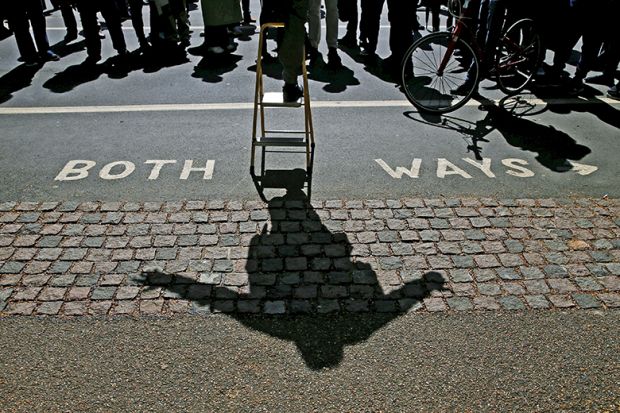UK students are becoming increasingly aware of risks to free speech on campuses, but while there is support for legislation, most feel that open debate is the way to overcome the issues, in what researchers have described as a rejection of the “culture wars”.
One of most in-depth surveys to date exploring students’ attitudes to freedom of expression, published by The Policy Institute at King’s College London on 29 September, finds that 49 per cent of students feel that universities are becoming less tolerant of a wide range of viewpoints, while only 11 per cent disagree. One in four students says they very or fairly often heard of incidents on campus where free speech is inhibited, up from 12 per cent in a similar survey conducted three years ago.
There is majority support among students for key elements of the Westminster government’s Higher Education (Freedom of Speech) Bill, with 57 per cent agreeing that universities should be liable for legal action if they fail to protect freedom of speech.
However, the overall results, based on polling of nearly 2,500 undergraduates and thousands more members of the public, are complex and sometimes contradictory. Among other key findings:
- Sixty-five per cent of students say free speech and robust debate are protected at their institution, up from 63 per cent in 2019.
- A growing minority of students say free speech is very or fairly threatened at their university (34 per cent, up from 23 per cent in 2019), but a greater proportion, 53 per cent, perceive it to be at greater risk in UK society as a whole.
- Eighty per cent of students say they are free to express their views at their university, more than the 70 per cent of the general public who say they feel free to do so in UK society as a whole.
- Forty-three per cent of students say they feel unable to express their views at university because they are scared of disagreeing with peers, up from 25 per cent in 2019, but the same proportion of the public say they are constrained from expressing their opinions in wider society.
- Forty-eight per cent of undergraduates say students avoid inviting controversial speakers to campus because of the difficulties in getting these events agreed, up from 37 per cent in 2019.
Bobby Duffy, professor of public policy at King’s and the director of the institute, conceded that the survey results could be used to reaffirm the views of both sides but called for a more nuanced debate.
“Overall, we can take from the findings that the threat to free speech in universities is not nearly as bad as some want to make out, but nonetheless there are important issues that need to be addressed to bolster the commitment to free speech. That seems to be where students themselves end up,” he said.
Professor Duffy noted that while students reported that their personal experiences indicated that people are free to express opinions, they were more likely to report having heard about threats to free speech, which may be reflective of the increased attention on the issue in politics and the press.
He noted that while there was support for the free speech bill, which would appoint a free speech director to the board of the English regulator, the Office for Students, and allow people to sue universities if they feel their free speech rights have been infringed, less punitive measures received the most support.
Seventy-one per cent of students said that training for students and staff on how to listen actively to the views of others would be effective, and 64 per cent felt the same way about training for students on the importance of allowing diverse perspectives to be heard, including those that are unpopular and which some find offensive.
“A big chunk of students are asking for help and support; they are not asking to close down debates,” Professor Duffy said.
“They are asking: ‘How can we do this better?’ The bill is focused on regulation and control, but there needs to be a more positive agenda about how you can support students and staff – and more broadly across society – in how to go about having these difficult conversations.”
Professor Duffy said that while it may feel that divisions along tribal lines are impossible to overcome, the nuances identified in the study indicated that views are not as entrenched as many believe.
“We have got a tendency to exaggerate and paint the student body as a 'snowflake' generation. It tends to boil down to absolutes on one side or another and no compromise is possible. That’s the main thing we have to fight against.”
POSTSCRIPT:
Print headline: Students in favour of bill to protect free speech
Register to continue
Why register?
- Registration is free and only takes a moment
- Once registered, you can read 3 articles a month
- Sign up for our newsletter
Subscribe
Or subscribe for unlimited access to:
- Unlimited access to news, views, insights & reviews
- Digital editions
- Digital access to THE’s university and college rankings analysis
Already registered or a current subscriber? Login








